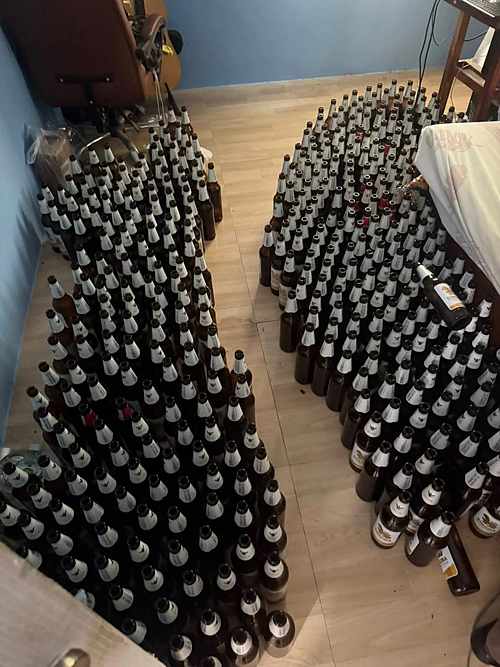Last week, rescue workers from the Siam Rayong Foundation arrived at a house in Ban Chang district, Rayong, to assist with a suspected seizure case. However, upon arrival, they confirmed the man had already passed away. The victim, Thaweesak Namwongsa, was divorced and had a 16-year-old son.
Namwongsa's son reported that his father hadn't eaten any food for over a month, subsisting solely on beer. On 17/7, the boy returned from school to find his father having a seizure on his bed, surrounded by hundreds of empty beer bottles.
Rescue workers noted over 100 beer bottles neatly arranged on the bedroom floor, leaving only a small path between the bed and the door. Namwongsa's son said he cooked for his father every day, but he refused to eat, continuing his beer-only diet.
Family members stated that Namwongsa had no serious underlying health conditions. However, following his divorce, he became depressed and turned to alcohol. Authorities suspect that this emotional distress led him to stop eating and replace food entirely with beer.
While beer provides calories, it severely lacks essential micronutrients like protein, vitamins, and minerals. Long-term reliance on beer can lead to exhaustion, liver damage, and metabolic disorders. According to medical experts, beer consumption should be moderate and cannot replace food over extended periods.
 |
Authorities documented 100 beer bottles in the man's bedroom. Photo: ท่านเปา |
Authorities documented 100 beer bottles in the man's bedroom. Photo: ท่านเปา
Some documents have recorded cases of people surviving on beer, especially during Lent. However, these individuals typically underwent prior physical preparation and supplemented their diets with basic nutrition.
In reality, numerous deaths have been recorded from consuming only a single food or drink over extended periods. In 2016, a man in the UK died after eating only boiled potatoes for months in an attempt to lose weight.
In the US, a woman died from severe malnutrition caused by drinking only soda instead of eating meals. These cases demonstrate that while some foods or drinks can provide temporary energy, they cannot replace a balanced diet. Vitamin, mineral, and protein deficiencies will gradually damage bodily functions, leading to severe consequences if not addressed promptly.
Thuc Linh (Oddity Central)












